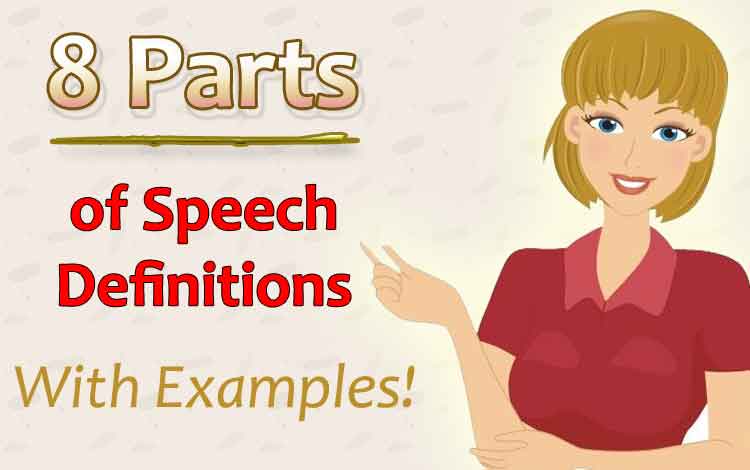8 parts of speech definitions with examples provide a simple definition and a couple of examples for the eight parts of speech. When you improve your grammar, you are taking the first steps in improving your communication.
The eight (8) parts of speech are the basic building blocks of language. It is imperative that you recognize the eight (8) parts of speech (see below) and learn how to use them in writing and speaking. The results will be that you will become a better communicator.

8 Parts of Speech Definitions With Examples
- Nouns
- Verbs
- Adjectives
- Pronouns
- Adverbs
- Prepositions
- Conjunctions
- Interjections
1. Nouns
Definition: A noun is a naming word. A noun may name a person, place, thing or idea.
- David walked to town.
- The car was damaged in the accident.
2. Verbs
Definition: A verb is either an action word or a state-of-being word.
An action verb is a doing word. A state-of-being-verb shows state-of-being or links two nouns together when they relate to each other in the same sentence. State-of-being verbs do not show action. They are: am, is, are, was and were.
- He threw the ball to his brother.
- He was hurt in the accident.
3. Adjectives
Definition: An Adjective describes or modifies a noun. Adjectives tell which, how many, what kind of and whose.
- My sister had an expensive car.
- The brave lady stopped the thief in his tracks.
4. Pronouns
Definition: Pronouns take the place of nouns. Pronouns are divided into first, second and third person.
- First Person Pronouns – person speaking – I, we, me and us
- Second Person Pronouns – person spoken to – you
- Third Person Pronouns – person spoken about – he, she, him, her, it, they and them
Some Examples:
- They played football over the weekend.
- It was a lovely day at the football.
- I enjoyed my weekend away.
5. Adverbs
Definition: Adverbs tell about verbs, adjectives and other adverbs. Adverbs add meaning or intensity to verbs. Adverbs tell how, when or where about a verb.
- He walked slowly to school this morning.
- The mechanic put the spanner over there.
6. Prepositions
Definition: Propositions show position or how things go together. Also they start prepositional phrases.
- The family went to the park on Saturday afternoon.
- Shane drove his car to the shops during the storm.
7. Conjunctions
Definition: Conjunctions are joining words. Coordinating conjunctions join things that are alike. Correlative conjunctions are always used in pairs.
- Jenny and David have lived in the same house since they were married.
- They rushed to work but they were still late.
8. Interjections
Definition: Interjections express strong or sudden feeling. They are not needed to complete a sentence.
- A strong interjection is followed by an exclamation mark and a capital letter.
- A mild interjection is followed by just a comma.
Some Examples:
- Wow, that was a great touch down.
- Ouch, that really hurt!
You can find more information about the 8 parts of speech definitions by clicking on this link!